#Jay Bellerose
Text
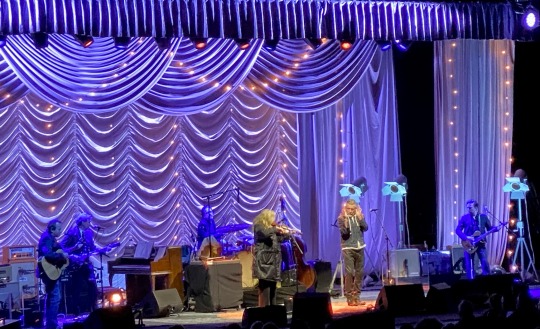

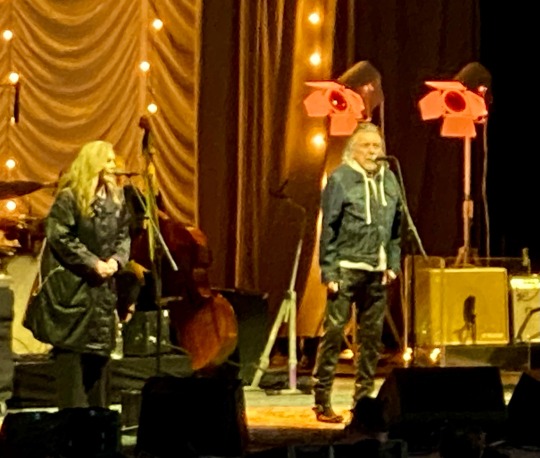
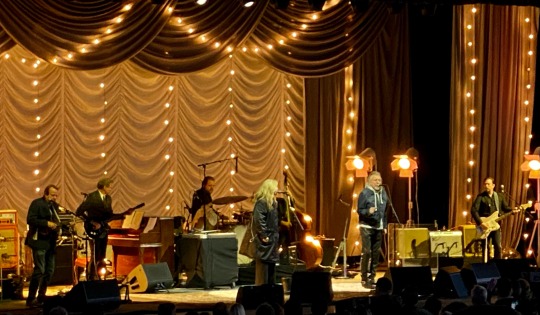
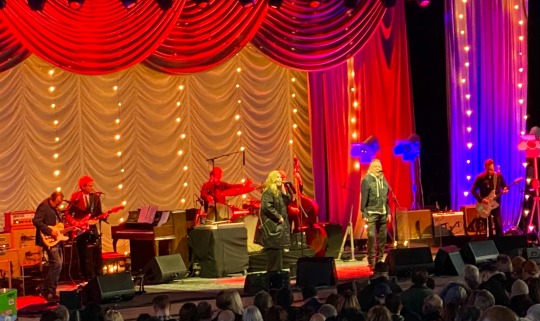
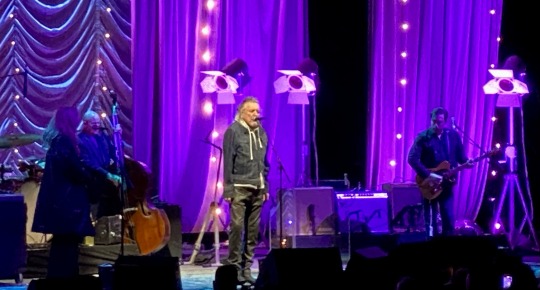
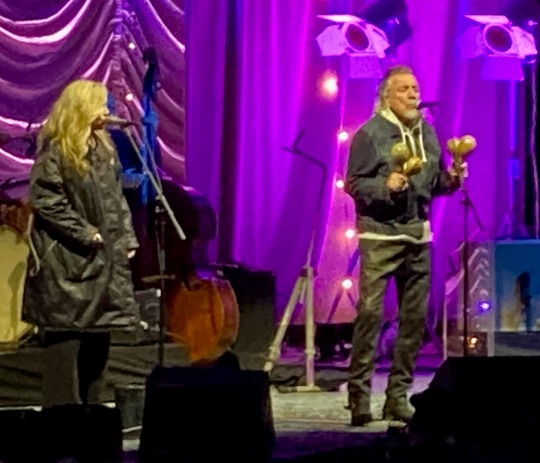
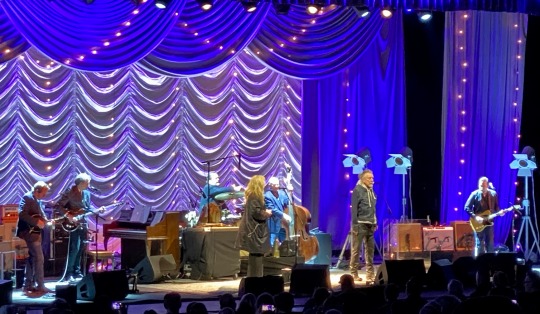
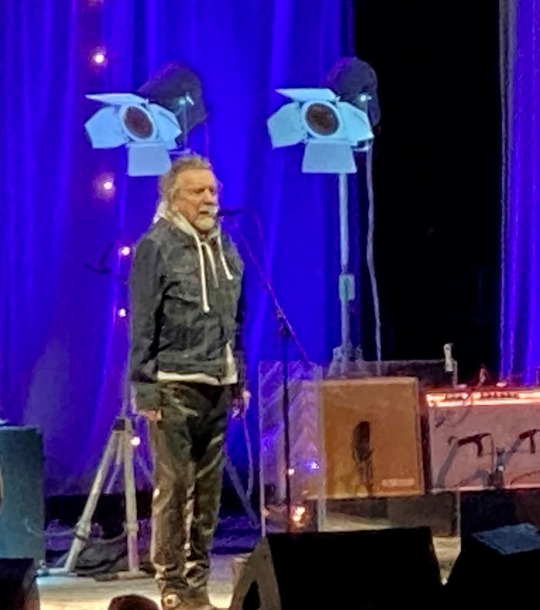
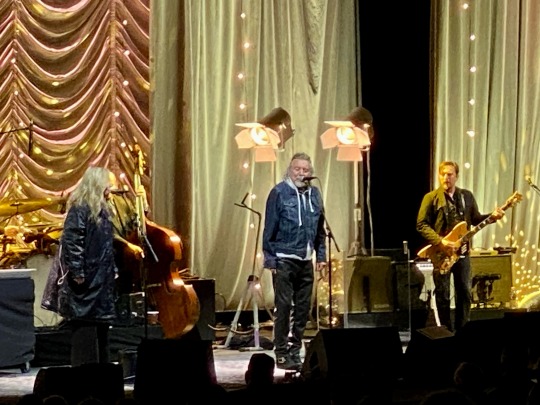
Robert Plant and Alison Krauss at Rose Music Center at the Heights, Huber Heights, Ohio, May 3, 2023
Emerging from opposite sides of the stage without introduction, Robert Plant and Alison Krauss clasped hands when they met in the middle and launched into “Rich Woman.”
It was the first of 17 selections from 2007’s Raising Sand and 2021’s Raise the Roof - plus a few smartly reimagined Led Zeppelin numbers - the pair played May 3 in opening the summer concert season at Rose Music Center at the Heights in Huber Heights, Ohio. But the first night of proverbial summer was “really fucking cold,” as Plant, in layers with hand warmers in his pockets, put it while Krauss stood beside him with her hands pulled into the sleeves of her heavy winter coat.
“Welcome to Norway,” the maracas-playing Plant said to the sold-out house that remained standing throughout the 90-minute, low-ember-glow of a performance.
Stoking the warm aural flame were drummer Jay Bellerose, who employed mallets, sticks, shakers and tambourine on his kit; double bassist Dennis Crouch; multi-instrumentalists Viktor Krauss (Alison’s sister) on guitar and piano and Stuart Duncan on guitar, mandolin and violin; and guitarist JD McPherson. The latter pulled double duty, opening the gig with a self-described “quick, efficient, (3)0-minute rock ‘n’ roll set” that mixed originals and such covers as Iggy Pop’s “Lust for Life” into a blend of 1950s rockabilly with sax and 1970s, guitar-based rock.
Plant and Krauss went back further, setting songs like “Fortune Teller,” “Please Read the Letter” and “Gone Gone Gone” in hazy, swirling arrangements that evoked misty sounds of bygone eras that wafted through vintage amps. The stage, with lighting and beige and white curtains to give the outdoor shed the ambiance of an indoor theater, bolstered the aural illusion.
Long reluctant to revisit his past, Plant transformed “Rock and Roll” into a country rocker built upon Duncan’s violin. He and Krauss would play twin lines on a dark, moody version of “When the Levee Breaks.” Its bright, sonic anthesis, the slowed-by-half “The Battle of Evermore,” sparkled on Duncan’s mandolin as Krauss subbed in for Sandy Denny on vocals.
Singing gently and passionately, Plant and Krauss wavered out of perfect key only occasionally, the former likely owing to his 74 years and the latter - who ceded all banter to her partner - fighting against the cold air and adjusting her earpiece.
Slightly less than flawless is nevertheless a Herculean achievement - particularly given the unseasonable temperatures and the newness of this leg of the Raising the Roof tour.
Grade card: Robert Plant and Alison Krauss at Rose Music Center at the Heights - 5/3/23 - A
5/4/23
#robert plant and alison krauss#robert plant#led zeppelin#alison krauss#alison krauss and union station#iggy pop#the everly brothers#2023 concerts#jay bellerose#stuart duncan#jd mcpherson#dennis crouch#viktor krauss#sandy denny#fairport convention
13 notes
·
View notes
Text
It was 15 years ago today: Allen Toussaint's Nonesuch debut album, The Bright Mississippi, was released. Toussaint explores the work of his New Orleans forebears on a soulful, live-in-the-studio jazz set, produced by Joe Henry, performing with Don Byron, Nicholas Payton, Marc Ribot, David Piltch, Jay Bellerose, and special guests Brad Mehldau and Joshua Redman.
"Exquisite" —Washington Post
#allen toussaint#the bright mississippi#new orleans#jazz#piano#joe henry#don byron#nicholas payton#marc ribot#david piltch#jay bellerose#brad mehldau#joshua redman#nonesuch#nonesuch records
1 note
·
View note
Photo

Robert Plant ı Alison Krauss
Raising Sand
2007 Rounder
—————————————————
Tracks:
01. Rich Woman
02. Killing the Blues
03. Sister Rosetta Goes before Us
04. Polly Come Home
05. Gone Gone Gone (Done Moved On)
06. Through the Morning, through the Night
07. Please Read the Letter
08. Trampled Rose
09. Fortune Teller
10. Stick with Me Baby
11. Nothin’
12. Let Your Loss Be Your Lesson
13. Your Long Journey
—————————————————
Riley Baugus
Jay Bellerose
Norman Blake
T Bone Burnett
Dennis Crouch
Greg Leisz
Alison Krauss
Robert Plant
Marc Ribot
Patrick Warren
* Long Live Rock Archive
#RobertPlant#AlisonKrauss#Robert Plant#Alison Krauss#Riley Baugus#Jay Bellerose#Norman Blake#T Bone Burnett#Dennis Crouch#Greg Leisz#Marc Ribot#Patrick Warren#Raising Sand#LP#Country#2007
16 notes
·
View notes
Text
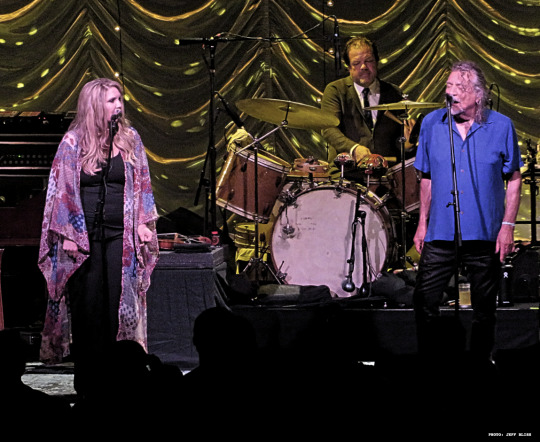
(Left to right) Alison Krauss, Jay Bellerose and Robert Plant (on their “Raise the Roof” tour) - Greek Theatre; Los Angeles, CA (8-18-22). @AlisonKrauss @RobertPlant
Photo: Jeff Bliss
#alison krauss#robert plant#jay bellerose#vocalists#drummer#musicians#rock and roll#rock shots#concert photography#rock photography#concert#music#americana#greek theatre#los angeles#raise the roof
10 notes
·
View notes
Text
Grant-Lee Phillips Interview: A Great Deal of Shared Experience

Photo by Denise Siegel-Phillips
BY JORDAN MAINZER
Singer-songwriter Grant-Lee Phillips was one of many artists who released an album during the pandemic that ended up being prescient. No, it’s not an obvious foreshadowing. His 10th studio album wasn’t titled anything having to do with masks or distancing or viruses. But the idea of his daughter screaming, “Come on lightning, show us your stuff” and the words resonating with Phillips enough to name an album after it is strangely consistent with that increased rediscovery of “the small things” many of us experienced over a time where we needed to stay separate from other people. It’s the immediate surroundings of nature that grounded Phillips when, after being forced to promote Lightning, Show Us Your Stuff via livestream only, he decided to give up dreams of touring any time soon and sit and write new material. Used to writing on the road with what he calls “a proper balance of stimulation and boredom,” Phillips opted for daily drives to the Tennessee countryside with his family to generate that previously missing sense of motion. They also gave him solace in the face of what was happening globally--a pandemic--and nationally, the 2020 U.S. Presidential Election and the January 6th, 2021 Insurrection.
Phillips slowly got used to writing from home and ended up churning out the songs that would eventually make up his 11th studio album All That You Can Dream, released last month via Yep Roc. Obviously, at the time of writing, the events of January 6th were top of mind and ended up inspiring songs like “Rats in a Barrel” and “Peace Is a Delicate Thing”. On the latter, Phillips compares peace to “snow on the ground,” as if the very concept that we take for granted is seasonal, dependent on who’s in power at the time. The general horrors of the Trump administration and its role as the beginning of the end rather than a blip inspire “Cut to the Ending” and “My Eyes Have Seen”, the latter specifically referring to the crisis at the U.S.-Mexico border. The overall trauma of the past few years manifested in “Cannot Trust The Ground”, whose title refers to the modes of thought of someone who has lived through earthquakes but makes the case that our collective societal turmoil is somewhat of a quake itself. Phillips also wrote songs for the people he spent most of his time with--himself and his family--in the form of “You Can’t Hide” and “Remember This”, the latter dedicated to his teenage daughter.
Once he had the songs written, Phillips reached out to many of his usual collaborators--drummer Jay Bellerose, bassist Jennifer Condos, keyboardist Jamie Edwards, pedal steel guitarist Eric Heywood, and cellist Richard Dodd--to add more sonic elements to the songs. (Phillips produced, recorded, engineered, and mixed the record at his Nashville home.) The pump organ of “Peace Is a Delicate Thing” gives it a nostalgic quality, as if Phillips is nostalgic for a bygone era where the entirety of American society wasn’t constantly under threat of violence. The subtle drum rumbles below the gentle acoustic guitar picking on “Cannot Trust the Ground” perfectly mirror the song’s sentiment. But as usual, the basis of the songs are as solo arrangements on acoustic guitar, and that’s why now, when Phillips is able to finally tour again, he’s still playing solo. “It’s something I’m at ease with,” he told me over the phone last month. “I can go to musical places--emotional places--on my own. That’s kind of where this material is formed. The moment conception takes place on a couch at home, or changing my strings in a hotel room in a foreign country. To carry that straight through to the final performance makes sense when you think about it.”
Phillips plays Friday night at the Old Town School of Folk Music. Read our conversation below, edited for length and clarity.

Since I Left You: The songs on All That You Can Dream are born out of such a specific time and place, written in somewhat of an isolation. Is it sort of weird to play them to an audience?
Grant-Lee Phillips: No, I wouldn’t say so. I feel like this is a situation where we’ve had a lot of shared experiences, be it isolation or anxiety. All of these things that have driven us inward back into our homes and minds. Even beyond language [barriers], there’s a great deal of shared experience. And it’s not as though we’re out of the woods. I’d love to believe we were. But I think the residue and trauma of what we went through is something we’ll be working through for some time, as well as the reality that we live in a time where we could see another rise of variants or you name it. It’s an unsettling era we’re existing in.
SILY: You’re used to turning back songs that have layers and elements into the solo performance they were born out of. But were there any unique challenges in doing that with this particular batch of songs?
GLP: Not especially. I have a different relationship to them. It’s like bringing them up as children, as seedlings of ideas or sketches. There are so many points in time where they could have gone a different way that only I’m privy to. The listener knows the composition as a layered, sonic experience, but it doesn’t really throw me to play a song like “All That You Can Dream” even though the album version is based in the piano and the production I apply to the arrangement. I guess I’m always kind of aware of that. Even with Grant Lee Buffalo, we had to be aware of who we were on an album and who we were on stage. In hindsight, I’ve come to realize the distinction wasn’t so different. You can go back and get it right on a record, I guess, but sometimes, you would chase your tail trying to find what would happen spontaneously when you stepped on a stage and plugged in. All of these musicians are chasing after that perfect way to get the song and the track.
SILY: There are a few songs here about Jan 6, 2021. You talk about history and our ideas and awareness (or lack thereof) of history repeating itself. On “Rats in a Barrel”, you sing, “I’m done with mercy / I’m all tapped out.” Do you find you have empathy fatigue for certain groups of people that participated in such activities?
GLP: I have to think about that. My feeling is that there are lots of people who have, for their own reasons, believed in things that were untrue and not to their benefit. The values of those who thought they were doing the patriotic thing of that day. I don’t have an omnipotent view of everyone who was there and who played a role in that. I think we’re only beginning to get a sense of those at the core and the planning and who would gain the most from retaining power. That is yet to be revealed, which is a very frustrating place to be for a lot of us in this country. The feeling that justice is delayed if absent for those who should be held accountable. Meanwhile, down here on the ground, where all of us live and do our work, justice comes quite rapidly, for the person with a broken taillight or outdated registration. Some of that frustration is the kind of thing that actually fuels such resentment, but where does that resentment go? It festers, and tragically, that very resentment--which is real and grounded in reality at times--is used to wrangle the mob against their own interests and certainly against the interests of a democratic society, a country that should be lifting one another up. But I’m very concerned. I lose a lot of sleep over it.
SILY: I was struck on “Cut To The Ending” when you sing, “History is told by an old man / Who survived the wars / Little talk of spineless enablers / Ones who held the door.” Why do you think we tend to forget the enablers of bad history?
GLP: Oh, gosh. There’s a point in time where the generations that experienced the atrocity no longer walk the earth. We live in a time where it’s almost criminal to impart or teach history, in [worlds] of strongmen and despots. You can see the way a society turns to a person who seems to have all the answers and like a steamroller plows over everyone who comes in their way and challenges their power. There was a story that I read how in the shadow of Mussolini, [Italy] looked towards him as a symbol of strength and masculinity, and many young men carried a picture of him in their pocket. Whether they did literally or not, that was the image of who a person they [thought they] should be. Might was always right. When it came to Hitler, the tragic mantra was always, “We can control him. We can use this guy and the numbers he has behind him and the impetus to exploit him.” What a tragic mantra. Those who hold the door and hang on to their little slipper of power, they too will come to realize they made decisions that weren’t in their best interest in the long term. That’s what that song is about. “Cut To The Ending” as if we’re watching another horror film where we know what’s gonna happen. You know what’s gonna happen when you mix certain chemicals.
SILY: When you sing, “A fool won’t listen to reason / Till he’s gone too far,” I thought of all the stories of unvaccinated folks in the hospital, previously adamant about not getting vaccinated, dying from COVID and begging nurses to give them the shot and the nurses saying, “Sorry, I can’t give it to you.”
GLP: The thought that there are so many who might have survived this period, the first, second, third waves of this pandemic had it not become so tribal: That’s beyond tragic. I’m not one to leap into every opportunity to get a vaccination. I’m not an anti-vaxxer, but even the flu shot, I think, “What is it? Do I have to get it?” I understand apprehension, especially when it comes to a situation they’re not used to. But the Trump administration did us no favors in how it was dealt with. I feel like the health officials were very slow to act. On one hand, it’s a miracle we have been able to develop vaccines, but we were told by officials, “Don’t wear a mask.” We were condescended to in that fashion. Though she defends her position, [former White House Coronavirus Response Coordinator] Dr. [Deborah] Birx was quick to pat Trump on the back about his head for details and not her own head as he blathered onward about bleach and lightbulbs and whatever else he was on about. I think that was a real low moment. I think people died because of it. What can you say? I don’t judge people who make those decisions--I have compassion for anyone who is being ripped off or hoodwinked. I feel like there’s been a lot of that.
SILY: On “My Eyes Have Seen”, you talk about the horrors of WWII and the border during the Trump administration. But I can’t help but think that the irony of that song is there’s still so much our eyes haven’t seen.
GLP: That’s true. That’s a good observation. My inspiration was pretty firmly planted in the border crisis. I hadn’t thought of the other implications you hit upon. But I think you can most certainly see parallels anywhere where people are targeted and become refugees of their own country, as is the case in Ukraine, or wherever. But the things that we don’t see is such a good point. We lived through the war in Iraq, and so much of that was really hidden from us as well. You don’t want to even entertain those thoughts--you want to believe the government is doing the right thing and that, “We’re the good guys.” But it hasn’t always been the case.
SILY: This record’s certainly not all political. A few tracks are strictly personal to you. Take the sentiment of “You Can Hide”, for instance, “You can’t hide no more than the sun or moon can hide.” Is that an oddly comforting message to yourself, or more of a warning?
GLP: That is very much a song to myself. I share it hoping it will strike a chord for someone else. But there is sort of a double meaning. We can’t hide from all of the things we’ve previously discussed. That is the world we live in. But we can’t hide from our nature to find joy and to laugh and be communal, [either]. All of these impulses to protect ourselves to be on guard against threat, but to socialize and pull together is in us, too. Sometimes, those very beautiful human impulses are exploited. The desire to respond as a group and marshal such power when we truly need to. That song is about those things, and also about trying to pull myself out of my dark place. It’s easy to go there and not want to come out.
SILY: You have a song for your daughter on here where you reference disagreements. You talk a lot politically about not thinking the same way as someone else, but the way you talk about it with your daughter, it’s more loving. How do you balance these different perspectives?
GLP: As a teenager, you’re trying to establish your independence. That’s that tug of war. It was nice to spend time off the road with my daughter, helping her with her homework, brushing up on the things I didn’t pay attention to the first time around. That’s one of the lyrics in that song: “We don’t always think the same / Not a crime to disagree.” And that is true, especially in that context. We have to find ourselves and make our own mistakes and come to our own conclusions, perform our own experiments. She’s preoccupied with traipsing through the woods and setting traps for lizards, and I’m the one saying, “Watch out for ticks!” That’s a different context than the political disagreements we [all] have. In the arena of social media, it’s difficult to have the kinds of conversations that would produce meaningful understanding. It’s kind of like Rock 'Em Sock 'Em Robots on Twitter, trying to get the last word in. You just follow the people that seem fairly balanced and insightful. There’s plenty to disagree with. I open up Twitter in the morning, and it’s like sticking my head in a furnace. The fire singes my eyebrows off, and I begin another day.
SILY: These songs were written a couple years ago. What else is next for you? Are you currently working on anything?
GLP: Someone from [Yep Roc] brought it to my attention that it was 20 months ago that I released my last record. These days, the thing that takes the longest is the packaging and manufacturing, especially vinyl. In the case of this record, that took many, many months. We finished it 9 months in advance to get everything lined up. I’ve been a prolific writer. I began writing this album a few months after the last one came out. I worked on it through the winter and spring, and by early summer, I handed it into the record company. We began figuring out how long it would take. It was a long time. So at this point, I anticipate more touring. Hopefully I’ll be back in Europe in December, possibly on the West Coast in the fall. I have some intriguing concerts in the coming year in France and the UK. I think in some ways I’m at the point where I want to savor touring and performing and playing all the songs I’ve recorded lately.
SILY: Is there anything you’ve been listening to, watching, or reading lately that’s caught your attention?
GLP: I’ve been really taken with Angel Olsen. I’ve got a couple different biographies to read. I’m also reading a [Geoffrey R. Stone’s] Sex and the Constitution, which is about sexuality and how it was dealt with going back to the Ancient Greeks, Romans, and Middle Ages, and the influence of Saint Augustine onward. How we got to this point in time where Supreme Court judges cite witch-burning jurors from 300 years ago to make the judgements of the day. [laughs] Good light reading.
youtube
#interviews#live picks#grant-lee phillips#yep roc#old town school of folk music#all that you can dream#denise siegel-phillips#lightning show us your stuff#jay bellerose#jennifer condos#jamie edwards#eric heywood#richard dodd#grant lee buffalo#angel olsen#geoffrey r. stone#sex and the constitution
6 notes
·
View notes
Text
youtube
A lot of female singer-songwriters of the 90's achieved their biggest triumphs in the period and that eventually became that. Paula Cole, for instance, had a successful period during the 90's that petered out after that time. True, she wasn't the only one of her peers with this fate – check the introductory statement to this post –, yet the reasons why differ from one to another. Paula Cole – this is my personal view – intended to have a different career than the one she actually got. I mean, her records do not lack in prowess, they're fine, they struggle to find an identity for her. While she did locate the latter recently, I keep asking myself – would she have been more accepted, had she had that during the 90's?
#Youtube#paula cole#this fire#feelin' love#jay bellerose#tony levin#greg leisz#seamus egan#90's music#alternative rock
0 notes
Text
youtube
0 notes
Audio
"Realities.com" by T Bone Burnett, Jay Bellerose, Keefus Ciancia https://ift.tt/h8byLEr
0 notes
Text
youtube
NYC Boogie - Noé Socha feat. Jay Bellerose
7 notes
·
View notes
Text
youtube
Dave Easley - Ballads
I loved Byways of the Moon, pedal steel virtuoso Dave Easley's previous record for Big Ego — so when the mensch Chris "Psychic Temple" Schlarb asked me to write the liners for Easley's Ballads LP, I said yes immediately. What an honor, ladies and gentlemen.
As great as Byways was, Ballads might be even better, with pedal steel-led versions of tunes by Ornette Coleman, Duke Ellington, Sonny Sharrock and more. And it's got guitarist extraordinaire Jeff Parker, ace bassist David Tranchina and expert drummer Jay Bellerose ... what more do you need? An instant classic, if I do say so myself. The record comes out on October 20, 2023 — go preorder it, for heaven's sake!
If you need a sample of what's in store, check out the above in-studio video of Duke's deathless "Fleurette Africaine." What a tune, what a sound.
8 notes
·
View notes
Text
With his latest release, “Ballads”, Dave Easley cements his reputation as one of the preeminent pedal steel guitarists in jazz today. Backed by an all-star band including guitarist Jeff Parker, double bassist David Tranchina and drummer Jay Bellerose, Easley puts his inimitable spin on jazz standards and deep cuts alike.
2 notes
·
View notes
Text
youtube
Song Review: T Bone Burnett feat. Lucius - “Waiting for You”
A tender folk ballad that pairs T Bone Burnett’s gravelly whisper with Lucius’ satin-smooth harmonies, “Waiting for You” is musically easy on the ears while the lyrics are too simple to take terribly seriously from a songwriting perspective.
Built around a gently strummed acoustic guitar, bumps from a double bass and steel wafting over the soundscape, “Waiting for You” announces the Other Side, Burnett’s first solo LP in nearly two decades.
And the flaccid A/A/A rhyme schemes - night-slight-light and clear-near-appear among them - suggest why Burnett has mostly made his bones as a producer. Man’s got the sounds; a collaborating lyricist would be a solid addition.
Out April 19, the Other Side also features cameos from Weyes Blood, Rosanne Cash, Stuart Duncan, Jay Bellerose and others.
Grade card: T Bone Burnett feat. Lucius - “Waiting for You” - C
2/29/24
#Youtube#t bone burnett#lucius#waiting for you#the other side#weyes blood#rosanne cash#stuart duncan#jay bellerose
0 notes
Text
Jeff Parker ETA IVtet — Mondays at The Enfield Tennis Academy (Eremite Records)

Photo by Mikel Patrick Avery
Mondays at The Enfield Tennis Academy by Jeff Parker ETA IVtet
Jeff Parker’s latest is a double album recorded live at the Los Angeles venue referenced in the title in the spring and summer of 2019 and the spring of 2021. In the context of the guitarist’s body of work, this quartet, with Jay Bellerose on percussion, Anna Butterss on bass, and Josh Johnson on sax, extends his minimalist approach. Both Johnson and Parker make extensive use of pedals that expand the sound, taking the place often filled by keyboards. The continuity of mood and tone in this trance-inducing set is remarkable, with, for example, nothing to distinguish the pre- and mid-pandemic dates.
The side-long tracks, averaging over 20 minutes each, are named only for the dates on which they were recorded and thus lack any point of reference beyond the music itself, which occupies a space somewhere between jazz and ambient similar to that explored by Parker with and alongside groups such as the Natural Information Society and tracing back to his time with Tortoise. The sound has a live feel but no audience noise. Apparently entirely improvisational, the music is nevertheless purposeful, evolving without reliance on crescendos or quick shifts in tempo or instrumentation.
A colleague at Dusted described this recording as “a groover not a smoover,” which gets to the heart of the matter: all four players remain committed to the collective project rather than relying on one another to support their soloing. To be sure, there are some fine solos, such as the elliptical guitar figure beginning around 2:45 on “2019-07-08 II,” the sax at around 11:00 on “2019-07-08 I,” and the back-to-back guitar and sax workouts in the first half of “2019-05-19” that develop organically with the support of the rhythm section. These and other moments, including the stately opening of “2019-05-19” after what sounds like glitchy organ and the emergence of a guitar (?) line that sounds like a Bitchin’ Bajas synth in synch with the drums around 13:00 on “2019-07-08 II” help shape the listening experience into a kind of journey.
Simultaneously soothing, playful, and thought-provoking, Mondays at the Enfield Tennis Academy is an outstanding recording with the potential to appeal even to those for whom Parker’s work with Tortoise or in other settings hasn’t resonated. The liner notes rightly compare the set to such landmark live recordings as Lee Morgan’s Live at the Lighthouse in which a band, rather than running through well-known pieces, uses the setting to make a fresh statement.
Jim Marks
#Jeff Parker ETA IVtet#Mondays at The Enfield Tennis Academy#eremite records#jim marks#dusted magazine#albumreview#jeff parker#jazz#ambient#tortoise#live#lee morgan
6 notes
·
View notes
Text
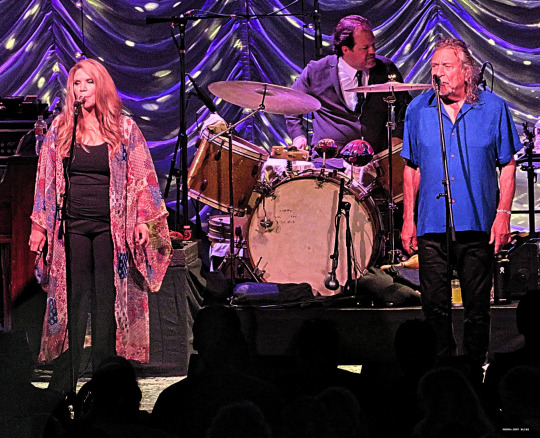
(Left to right) Alison Krauss, Jay Bellerose and Robert Plant (on their "Raise the Roof" tour) - Greek Theatre; Los Angeles, CA (8-18-22). @AlisonKrauss @RobertPlant
Photo: Jeff Bliss
#robert plant#alison krauss#raise the roof#jay bellerose#vocalists#drummer#singing#rock and roll#rock photography#rock shots#concert photography#concert#musicians#greek theatre#los angeles#americana#blues#music#singer songwriter#bluegrass-country#women who rock
9 notes
·
View notes
Link
https://ronblock.com/
https://www.facebook.com/RonBlockMusic
https://damienokane.co.uk/
https://www.facebook.com/damienokaneofficial
https://open.spotify.com/album/6CjtuxVMwl6cAm4a0HK837
0 notes
Text
youtube
Rick Parashar was a lot of things to many musicians as we can glean from our illustrious discussions on the players he worked with, but I would suggest he molded the 90's. To be honest, him being connected with the period and those that took the wrong lessons from them should've meant he probably worked with a lot of musicians in the vein of Melissa Etheridge, whose biggest career break occurred in the period Parashar made his name. Sadly, he didn't work with any of them that much, he only helmed Melissa Etheridge's Lucky, which is not a bad album – some parts there are quite good –, yet you keep thinking how him producing her work in the 90's would've sounded like. Then again, were Mrs. Etheridge and her peers really close to the alternative rock of the time.
#Youtube#melissa etheridge#lucky#lucky song#erich schermerhorn#james harrah#kenny aronoff#jay bellerose#rick hopkins#josh preese#david cole#mark browne#bernie barlow#brandi carlile#kipp lennon#rick parashar#00's music#alternative rock
0 notes